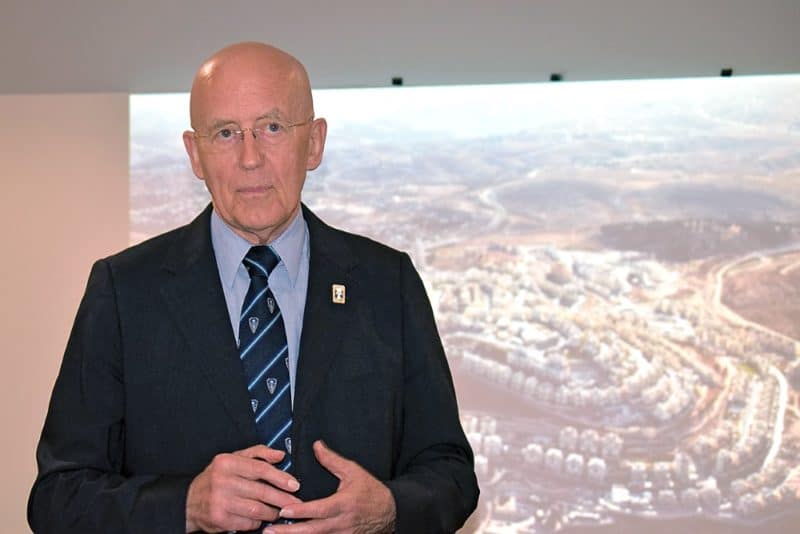Keeping hope alive for the Palestinian students of Bethlehem University is one of the biggest challenges for vice-chancellor Br Peter Bray, FSC, because the students’ way to education is literally paved with barriers, trenches and walls that they (students) have to overcome every single day.
Br Peter, a New Zealander who has been the vice-chancellor for the last 12 years, said there is little for Palestinians to be optimistic about. He spoke at the Pompallier Diocesan Centre on January 29 at an event organised by Auckland diocese’s Justice and Peace Commission.
“Hope has [to have] something [to do] with, for our students in that situation, realising that there are people outside that situation who have some understanding of what’s happening there and are standing in solidarity with them. The key thing is they are not forgotten,” he said.
“And so, for me to go back and tell students there about this group that gathered to listen about them will let them know they are not forgotten,” he said, as he thanked the people who attended his presentation.
Br Peter highlighted the severe restrictions on movement imposed by the Israeli government to control Palestinians. Checkpoints are spread throughout Palestine, with four around Bethlehem.
This means the students’ social lives are restricted. They cannot come and go to or from their friends’ houses as they please. Their time is wasted on fruitless searches by Israeli soldiers at checkpoints. Sometimes, they are even strip-searched.
“The checkpoints are the ones that are the most in their face,” said Br Peter.
Br Peter said the injustices that Palestinians deal with, like the expansion of Israeli settlements into their land, are plenty and huge. As a university, he said, they have a responsibility to resist injustice.
“What we’re trying to do in that resistance is to highlight the injustice of it and to try [to] bring about a change,” he said.
“I think it’s important to say that it is not a passive helplessness. Non-violent resistance is an active thing. It’s a resistance moving towards faith, hope and love, in an effort to overcome darkness and hatred. We are not trying to return like we receive.”
Br Peter said that [this year] Bethlehem University has about 3200 students, 76 per cent of whom are Muslims, while the remaining 24 per cent are Christians. In Palestine only about two per cent of the population are Christians.
“One of the reasons the university was started was to provide support for Christians in the Holy Land,” he said. The university is a joint venture between the Vatican and the De la Salle Brothers.
Before the university started, Br Peter explained, Christian students had to leave Palestine to get a tertiary education. “And they never came back,” he said.
He said the university provided opportunities for Christian Palestinians to stay in Palestine.
This also meant that Muslim and Christian Palestinians get the opportunity to meet each other and appreciate one another. “I think this is one of our significant contributions to Palestine,” he said.
Amid all the chaos in their lives, Br Peter said the university is trying to provide an “oasis of peace”.
He said they are freeing students “from all that limits their capacities”
“When they walk in the university, they are safe,” he said. “They are in a safe, caring, predictable environment.”
A student in one of the video interviews that Br Peter played for the Auckland audience said, “they do not think of me as a number, but as a leader for the next generation”.
The university has five faculties: education, science, nursing, business and arts, as well as an institute for hotel management and tourism. In 2012, the university purchased an abandoned hospital building, and converted it into a facility for teaching hotel management.
Br Peter called on Kiwi Catholics to stand in solidarity with the university. He said they are limited in all sorts of ways.
“I would just like to make a point that solidarity is not charity,” he said. “It’s not an insignificant thing. It requires you to take a stand.”

Peace is the ideal. It is what everyone wants. This is Christianity.
But throughout history the reverse has been happening where Muslims are concerned.
To believe in the Trinity invites a beheading. The comment in the Koran is against biblical truth.
The reality is that each day, in France two churches on average are desecrated.
The biggest problem is academics, politicians, media, churches who fail the community by not doing their homework.
Pope Saint John Paul II spoke of the need for prudence in dialogue. He also believed Europe would need a faith lived with integrity, as well as the army. The Dutch church is hardly a faith lived with integrity, having given into Secular Humanism. The Netherlands birth-rate is around 1.1, which means in four generations will be ten per cent of its status, while Muslims breed much faster. Most today would not be fazed by the statement “Islam is a religion of peace” as slowly the public have been doing a catch-up on what education was denied them as they grew up in colleges and schools.
The key figure is Mary, as Queen of Peace, and everyone should simply pray to her. She is hugely respected by Muslims.
In Zeitoun Egypt she arrived and allowed herself to be photographed and televised above the church of the nativity. What was a planned blood bath simply did not happen.
That means some more interest in the Medjugorje following, with its 40,000,000 pilgrims- to Mary Queen of Peace.